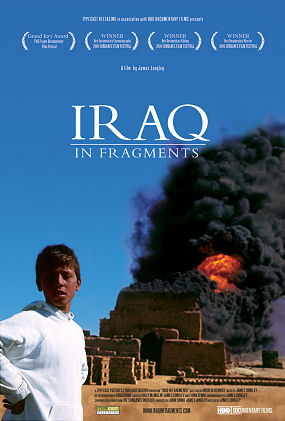Does this justifiably pissed-off letter from John Sinno, producer of the Oscar-nominated feature-length doc Iraq in Fragments, complaining about Jerry Seinfeld‘s having referred to the five nominated docs on last Sunday’s Oscar telecast as “incredibly depressing,” increase or decrease the possibility that Seinfeld might be hired to host next year’s Oscars? Or does anyone care how ticked off Sinno and other doc makers might be? People laughed at Seinfeld’s joke, after all.

They shouldn’t have, and they damn well should care. Seinfeld not only dissed the docs and their makers — he flat-out lied. The better-made docs don’t depress you — they get the blood going. There’s at least the same amount of narrative punch, thematic weight and genuine emotion in a typical well-made doc as can be found in most mainstream features these days, if not more so. Docs are what you pop into the DVD player when you want to feel something real, when you want to flush the crap out.
“I had the great fortune of attending the 79th Academy Awards following my nomination as producer for a film in the Best Documentary Feature category,” Sinno begins. “At the Awards ceremony, most categories featured an introduction that glorified the filmmakers’ craft and the role it plays for the film audience and industry. But when comedian Jerry Seinfeld introduced the award for Best Documentary Feature, he began by referring to a documentary that features himself as a subject, then proceeded to poke fun at it by saying it won no awards and made no money. He then revealed his love of documentaries, as they have a very “real” quality, while making a comically sour face.
“This less-than-flattering beginning was followed by a lengthy digression that had nothing whatsoever to do with documentary films. The clincher, however, came when he wrapped up his introduction by calling all five nominated films “incredibly depressing!”
“While I appreciate the role of humor in our lives, Jerry Seinfeld’s remarks were made at the expense of thousands of documentary filmmakers and the entire documentary genre. Obviously we make films not for awards or money, although we are glad if we are fortunate enough to receive them. The important thing is to tell stories, whether of people who have been damaged by war, of humankind’s reckless attitude toward nature and the environment, or even of the lives and habits of penguins.
“With his lengthy, dismissive and digressive introduction, Jerry Seinfeld had no time left for any individual description of the five nominated films. And by labeling the documentaries ‘ncredibly depressing,’ he indirectly told millions of viewers not to bother seeing them because they’re nothing but downers. He wasted a wonderful opportunity to excite viewers about the nominated films and about the documentary genre in general.

“To have a presenter introduce a category with such disrespect for the nominees and their work is counter to the principles the Academy was founded upon. To be nominated for an Academy Award is one of the highest honors our peers can give us, and to have the films dismissed in such an offhand fashion was deeply insulting. The Academy owes all documentary filmmakers an apology.
“Seinfeld’s introduction arrived on the heels of an announcement by the Academy that the number of cities where documentary films must screen to qualify for an Academy Award is being increased by 75%. This will make it much more difficult for independent filmmakers’ work to qualify for the Best Documentary Feature Award, while giving an advantage to films distributed by large studios. Fewer controversial films will qualify for Academy consideration, and my film Iraq in Fragments would have been disqualified this year. This announcement came as a great disappointment to me and to other documentary filmmakers. I hope the Academy will reconsider its decision.
“On a final note, I would like to point out that there was no mention of the Iraq War during the Oscar telecast, though it was on the minds of many in the theatre and of millions of viewers. It is wonderful to see the Academy support the protection of the environment. Unfortunately there is more than just one inconvenient truth in this world. Having mention of the Iraq War avoided altogether was a painful reminder for many of us that our country is living in a state of denial. As filmmakers, it is the greatest professional crime we can commit not to speak out with the truth. We owe it to the public.
“I hope what I have said is taken to heart. It comes from my concern for the cinematic art and its crucial role in the times we’re living in.”
